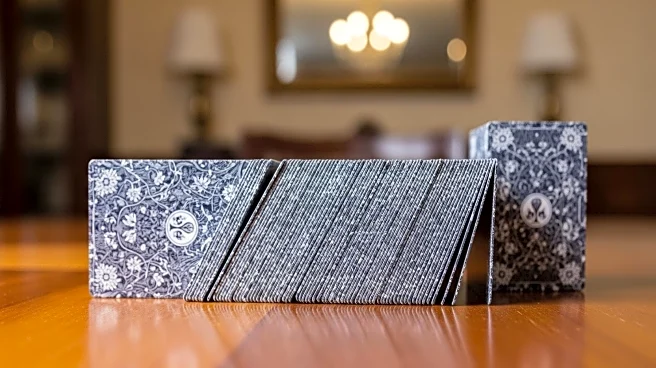What is the story about?
What's Happening?
The New York Times Strands puzzle for September 28, 2025, presents a new theme titled 'Hit the Deck!' Participants are tasked with finding words that fit this theme, including a spangram that spans the puzzle. The goal is to uncover all theme-related words, such as JACK, QUEEN, KING, CLUBS, HEARTS, DIAMONDS, and SPADES. The puzzle encourages players to find hidden words, revealing theme words as they progress. This interactive challenge is part of the NYT's suite of puzzles, including Wordle, Connections, and Mini Crossword, offering daily mental exercises for puzzle enthusiasts.
Why It's Important?
The NYT Strands puzzle is a popular feature that engages readers with daily brain teasers, promoting cognitive skills and problem-solving abilities. By introducing new themes, the puzzle maintains interest and encourages regular participation, contributing to the NYT's reputation as a provider of quality entertainment and intellectual challenges. The puzzle's popularity reflects the growing demand for interactive content that combines fun with mental stimulation, appealing to a wide audience seeking leisure activities that also enhance cognitive function.
What's Next?
As the NYT continues to innovate its puzzle offerings, players can expect more diverse themes and challenges that test their vocabulary and strategic thinking. The success of the Strands puzzle may lead to further expansion of the NYT's puzzle portfolio, potentially introducing new formats or collaborative puzzles that engage a broader audience. The ongoing development of these puzzles will likely focus on enhancing user experience and maintaining engagement through creative and challenging content.
Beyond the Headlines
The popularity of puzzles like Strands highlights a cultural shift towards activities that combine entertainment with intellectual engagement. This trend may influence other media outlets to develop similar content, fostering a competitive landscape in the realm of interactive entertainment. The emphasis on cognitive challenges reflects broader societal interests in mental health and wellness, encouraging activities that support brain function and stress relief.
















